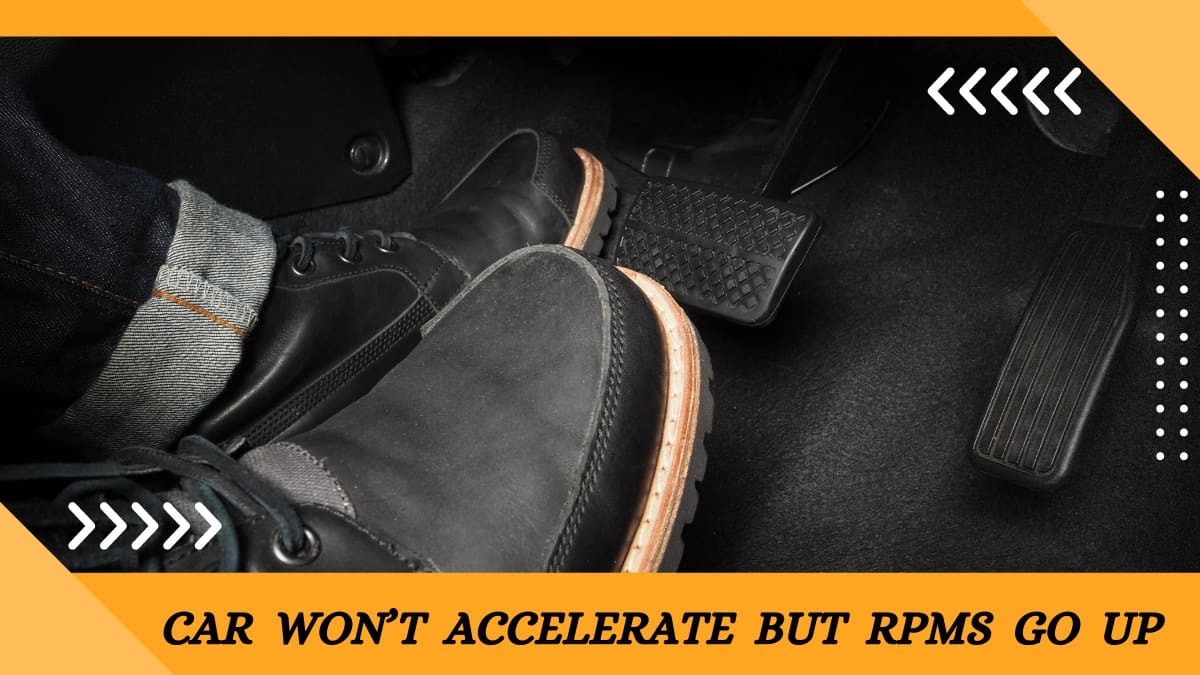
Do you want to know why your Car won’t accelerate but RPMs go up? If yes, read this article.
You can have a lovely experience and hear a distinctive sound when you own a car and rev up a strong engine. It indicates that your vehicle is ready. You may feel annoyed when you apply your foot on the gas pedal, but the car doesn’t accelerate. There are specific reasons for your car not accelerating.
It is a prevalent issue found in vehicles with high mileage, but any severe concerns are not there regarding sensitive engine faults. A few reasons behind this are minor and can be resolved. Let’s go through some common reasons cars won’t accelerate properly.
Revolutions per minute or RPM is a measurement of how many times the crankshaft of an engine rotates in a minute. Your car’s rpm gauge lets you know how quickly the motor turns at any particular time.
RPM is crucial for some reasons. It first informs you of the power and rotational speed of the engine crankshaft. An engine with a faster crankshaft rotation generates more energy.
Second, RPM matters since it impacts your car’s gear ratios. Each gear in your vehicle has a unique balance between the engine speed and the wheels’ speed. Your vehicle has a specific amount of loads.
Because the lower gears have more excellent ratios, the engine speed is moving faster than the wheels’ speed. Because of this, your car can accelerate more quickly in lower percentages. The engine speed is slower than the wheels’ speed because the higher gears have lower ratios. Your vehicle can move through higher gears because of this.
Finally, RPM is crucial since it influences how efficiently your car uses fuel. The fuel burned in an engine increases with the crankshaft’s speed. Driving at lower speeds and in higher gears will improve fuel economy.
Numerous factors make it crucial to know your car’s RPM. One benefit is that it can aid with engine troubleshooting. If your RPM drops below average without warning, your engine can have a problem.
Additionally, maximizing your fuel mileage can be accomplished by being aware of your RPM. Generally speaking, your car will use more petrol the higher its RPM. Undoubtedly, there are circumstances in which you must raise your RPM, such as when accelerating or climbing a hill. Therefore, it is essential to maintain your RPM as low as possible if you want to save money on fuel.
Even though the RPMs are increasing, your car may not be accelerating for many reasons. It can be a mechanical issue, a fuel system issue, or an ignition system issue. Let’s examine each of these options in greater detail:
Reasons for Car won’t accelerate but RPMs go up:
You control the valve inside the vehicle’s throttle body by pressing the gas pedal. With the opening of the valve, more air transmits to the engine, which will mix with more fuel to create more power. Nowadays, electronic throttle mechanisms are standard on most vehicles. In comparison, some old cars have a mechanical linkage between the pedal and throttle body.
If the throttle body doesn’t respond when you press on the gas, the car behaves strangely when you hit the gas. At the same time, the engine will start smoothly. To find the source of the problem, you may visit the nearest car service shop.
If your car has a manual transmission, a sliding clutch disc is a significant cause of this problem. The friction material on the manual transmission’s clutch deteriorates with time, due to which the transmission slips. The engine will function properly, but the power won’t be able to go up to the driveshaft. It happens because of the slippage between the vehicle engine and transmission.
Cars with automatic transmissions can also face a similar issue. Automatic transmissions use fluid pressure to translate engine power to the crankshaft. The automatic transmission fluid inside the transmission may become dirty and worn out over time. It makes the transmission slip. You can fix it sometimes by simply refilling the transmission with fresh fluid. But for this, you might need a more extensive transmission service.
If there is no issue with the transmission, then there could be a problem achieving the appropriate air/fuel ratio in the engine. The engine may work, but it won’t be able to generate much or any power if the engine’s airflow sensors are not okay. The mass airflow sensor instructs the engine’s computer on how much air reaches the engine. In comparison, the O2 sensors lead the computer regarding the oxygen levels in the exhaust.
Based on this information, the computer decides the engine’s fuel requirement. Suppose these sensors are fouled with carbon buildup. In that case, the engine’s computer may gather incorrect information regarding how much fuel to circulate to the engine, leading to slow performance or failure to move much.
The fuel filter supplies clean fuel to the engine. Similarly, an air filter fills clean air to a vehicle’s engine. This clean air then utilizes in the air-fuel mixture, which will then reach the combustion chambers to burn.
If the air filter faces blockage, the engine won’t be able to get the proportionate amount of air-fuel mixture. It leads to slower acceleration. You should replace the air filter to resolve the issue as soon as possible.
Fuel is an essential part of the engine of the car. The problem in the fuel system may create a problem for the machine. It’s unable to get a sufficient amount of fuel. Due to this engine may run abnormally and stall altogether. There could be a variety of fuel issues that can cause this problem. It includes a clogged fuel filter, a faulty fuel pump, or a leak in the fuel line.
A vacuum leak is another possible reason for this problem. The engine functions appropriately due to the vacuum. The leakage in the vacuum disrupts the engine. It might operate strangely or even stall. It might be an intake manifold leak, a fractured horse, or a bad gasket.
These issues can cause your car to hesitate or stall when RPMs go up. If you cannot know the problem, it’s better to take the vehicle to the nearest auto station.
The Throttle Position Sensor’s (TPS) principle is to find the opening angle controlled in the throttle valve by the accelerator pedal. Then TPS circulates this data to the ECU. In case of a malfunction of TPS, the accelerator pedal loses control over engine speed. Due to this, the engine speed will increase or decrease without any press or depress of the pedal.
An issue with the ignition system is another possible reason for this concern. If your car’s spark plugs are fouled, and the wires are damaged, it needs attention, as this can prevent the spark from igniting the fuel properly. It can cause the engine to fail and run oddly.
If on pressing down the gas, the engine revs, but the car doesn’t accelerate much or is going slow, then your vehicle is having the problem of transmission slipping. Transmission slipping is a prevalent problem. But if it’s not taken care of, it may lead to full-blown transmission failure. Let’s understand some of the top causes of transmission slipping:
The clutch in your transmission manual might have worn out, or there could be any other issue with it. If that’s the scenario, the grip seems soft/spongy as you press it. There could be a variety of strange sounds or the smell of burning with the friction caused by the clutch sliding.
The level of the transmission fluid needs to be increased. If you don’t have enough fluid in your transmission, and the pump that pumps oil for the transmission and the torque converter is running dry, the hydraulic pressure is lost to the transmission solenoid. It can cause shifting to be irregular.
The level of transmission fluid is high. Filling up transmission fluid too much increases the risk of cavitation, a phenomenon in which the pressure of the liquid falls below that of the transmission’s vapour pressure, which causes the fluid in your transmission to bubble up. Cavitation can cause rough shifting and internal damage to the transmission and oil depletion.
The pressure of the transmission fluid needed to increase: The P0868 error code when performing OBD-II tests could result from leaks, a malfunctioning engine pump, or pressure sensors.
Filter in your transmission could get blocked, where your transmission cannot draw the required fluid for transmission via an oil pump to have a properly functioning solenoid. It results in slipping, erratic shifting, and even malfunction in shifting.
The filtering of the transmission is dirty. The transmission fluid will be transparent, red liquid if it is in good shape. It would most likely hinder proper shifting when it’s burning, or gritty. You might need a professionally-run transmission flush, a new filter, or fluid replacement.
An issue with the solenoid of the transmission. Solenoids are within the transmission and direct hydraulic fluid to the valve body to activate the proper gear. If you’ve got a defective solenoid for your transmission, you might encounter erratic shifts and slippage of the shift or total inability to change.
Electronic component malfunction. Suppose you have an electronic throttle body that has been damaged or worn-out dial. In that case, you can get an interruption in communication between your electronic throttle body (ETB) and the transmission control module (TCM), which can result in the shift being missed, not a change whatsoever, or even skipping gears (Let’s suppose 2nd through 4th, but not hitting the 3rd).
The transmission control module is faulty (TCM). If your vehicle is equipped with an inoperative TCM, it will not communicate properly with the solenoid. It will result in excessive revs and erratic shifting. Specific TCM problems are the result of bent pins or excessive corrosion of the pinout.
Many components could be malfunctioning: Modern vehicle transmissions are advanced electro-mechanical components. Your transmission may be slipping due to some issues. For a precise diagnosis and a reputable repair, connect with a local dealer in your area.
So that’s it for today’s blog on “Car won’t accelerate but RPMs go up”.
After reading this article, you would have understood why the car won’t accelerate but RPMs go up. From throttle body issues and bad O2 sensors to malfunction of TPS and ignition system problems, there are several reasons leading to this problem. Apart from this, sometimes it also happens that the car revs high but moves slowly.
It has a central connection with transmission slipping. Transmission slipping occurs for various reasons like dirty transmission fluid, electronic component failure, bad transmission solenoid, etc. You can take the help of your mechanic or visit the nearest auto repair shop to fix the issues with your car.
Fill out the contact form and we will call you as soon as possible to discuss service, repairs or any general enquiries.
